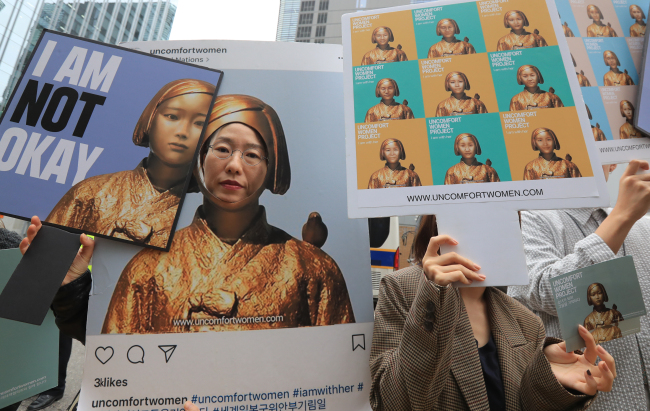A memorial and exhibition hall for Korean women forced into sexual slavery for Japanese troops during World War II opened near Seoul on Saturday after nearly two years of construction, officials said.
The two-story hall with a space of 1,300 square meters has been built on the compound of the House of Sharing, a shelter for sexual slavery victims, euphemistically called "comfort women," in Gwangju, about 40 km southeast of Seoul.

The memorial hall was built in the traditional Korean style, called hanok, with financial support from central and provincial governments and supporters of comfort women, said the officials.
Construction began in February 2016.
On the first floor, relics, personal articles and records left by deceased victims and paintings drawn by comfort women are on display. A special exhibition section is also located on the same floor.
The second floor features a list and photos of sexual slavery victims at home and abroad. Photos of 105 victims, including 22 foreigners, are put up on the center wall, along with Korean and English names of other 280 victims whose photos are not available.
Hand and footprints of the victims are also on display.
The memorial hall will be formally open to the public in January next year after additional landscaping work, according to the officials.
Saturday's opening ceremony was attended by government officials, lawmakers, families of victims and volunteers, including 40-odd activists from Japan.
"History is said to be a mirror of future. I expect this memorial hall will serve as a venue to reflect on our painful history and cherish the memory (of victims). In particular, I wish young people will be able to learn about women's wartime human rights," Chung Hyun-back, minister of Gender Equality and Family, said in an address at the opening ceremony. (Yonhap)









![[Kim Seong-kon] Democracy and the future of South Korea](http://res.heraldm.com/phpwas/restmb_idxmake.php?idx=644&simg=/content/image/2024/04/16/20240416050802_0.jpg&u=)








![[KH Explains] Hyundai's full hybrid edge to pay off amid slow transition to pure EVs](http://res.heraldm.com/phpwas/restmb_idxmake.php?idx=652&simg=/content/image/2024/04/18/20240418050645_0.jpg&u=20240418181020)

![[Today’s K-pop] Zico drops snippet of collaboration with Jennie](http://res.heraldm.com/phpwas/restmb_idxmake.php?idx=642&simg=/content/image/2024/04/18/20240418050702_0.jpg&u=)